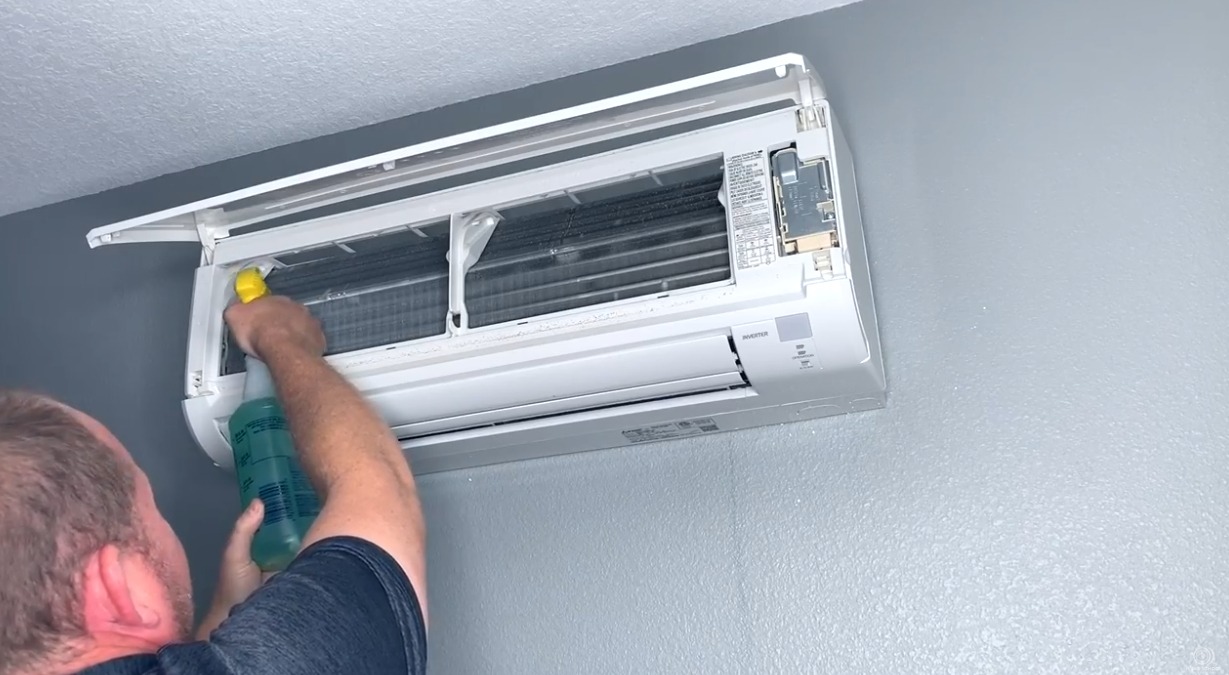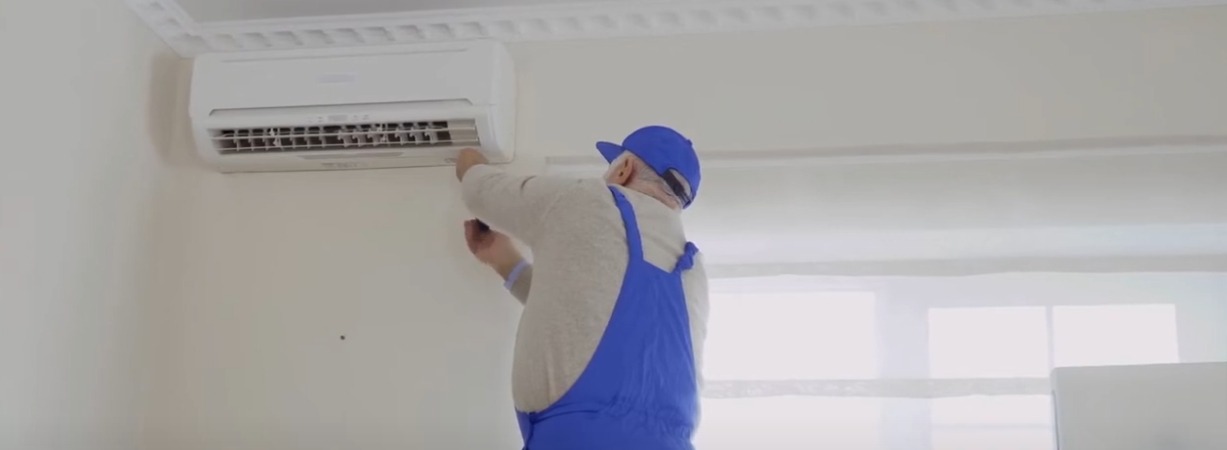The common reasons behind the AC unit’s musty smell are mold or mildew growth, evaporator coil freeze, poor airflow, clogged condensate line, and many others. If you encounter musty smells after switching on your cooling system, it is not only an unpleasant experience but also an indicator of potential problems.
Take a look at our comprehensive guide: why does your AC unit smell musty where you’ll get to know:
- Common reasons behind the unpleasant odor,
- Types of musty smells, and
- Solutions to fix it and prevent health hazards.
Let’s get started!
How Does Your Air Conditioning Unit Work?

An air conditioning unit’s main work is to remove heat and circulate cool air across a room through the refrigerator. It is useful to improve air quality and control humidity levels.
So, how exactly does your air conditioner do this process? The central air conditioning system has two key components:
- Indoor unit (it contains evaporator coils, a blower, and an air filter) and
- Outdoor unit or condenser unit (it contains the compressor, condenser coils, and a fan).
Here are the 4 steps showing how an AC works:
Step 1: Thermostat Signals for Cooling the Air
Switch on the AC and set the desired temperature through the thermostat. This will trigger the sensors to set the temperature in your home. After that, the compressor will turn on so that the refrigerant and fan start their work across the system.
Step 2: Refrigerant Absorbs Heat from Indoor Air
The air becomes cold when the refrigerant becomes warmer. The cold refrigerant stops the evaporator coils and contact with hot indoor air. Whenever the air moisture increases, the vapor turns into water because of condensation. The water is drained outside and prevents walls, floor, and AC damage.
Step 3: Fans Blow Back Cooler Air
The fan blows cold air across the evaporator coils. Do you have a central AC unit? If yes, the cold air travels through the ductwork and provides cool air. But if you have a window or split system, the cold air will be confined to where it is installed.
Step 4: The Refrigerant Emits Heat Outdoors
When the refrigerant reaches its limit to absorb heat, it releases the heat outdoors through the condenser coils. The refrigerant will continue releasing heat as long as the outside environment is hot.
Is it safe to breathe in Musty Smell Coming from the AC Unit?
Breathing in the musty smell from your AC unit is unsafe. Here are 5 common health issues you might face inhaling musty odors:
- Allergic reactions: Breathing mold or musty smells can cause allergic reactions like runny nose, watery eyes, coughing, and sneezing.
- Respiratory issues: When you breathe mold or mildew, it causes shortness of breath, issues, and airway infections.
- Infections: Musty air can lead to fungal infections, especially in people with compromised immune systems.
- Toxic mold exposure: Some types of mold, produce mycotoxins that can cause more severe health issues, like headaches, fatigue, and others.
- Long-term health effects: Musty air or poor air quality can lead to long-term conditions, such as chronic sinus infections, lung inflammation, and reduced lung function.
What are the Unpleasant Types of Air Conditioning Smells?
Air conditioner users experience 9 common types of unpleasant odors, including:
Dirty Air Filter
The AC system captures airborne contaminants and bacteria and circulates clean air throughout your home. If the air filter fails to be maintained properly, it leads to bacteria and microbes, which cause a musty smell. Change your air filter every three months, depending on your usage, to maintain a properly worked air filter.
Mold or Mildew
When your AC is running, a lot of condensation builds up; it smells musty or damp. If you notice unpleasant air odors, then mold or mildew may have settled into your AC unit’s interior. However, if the mold level increases a lot, there is a lack of moisture and poor air quality within your home, which increases respiratory problems.
Gas or Rotten Eggs
When you experience a window AC unit that smells musty like rotten eggs in the pantry, the reason will be a gas leak. The eggy smell of sulfur should not be taken lightly. You must shut off your AC and call an HVAC expert. Low levels of gas exposure are harmful to health, but continued exposure causes serious hazards.
Chemicals
Do your AC smell like formaldehyde, paint thinner, or other chemicals? These toxic air conditioner odors could be a sign of liquid leaking inside the HVAC system. So, don’t be late to fix it because the odor is a serious threat to your health.
Exhaust Fumes
Sometimes, you might experience a smell like the exhaust fumes from a car. These types of HVAC smells often indicate that you have a fluid leak in the system. This liquid then drips onto the motor or other heated mechanical parts and causes exhaust fumes. The smells can be dangerous for your health, so try to fix it immediately.
Socks or Dirty Feet
Another of the most unpleasant odors you’ll encounter is smelly socks, which HVAC professionals refer to as “dirty sock syndrome.” However, you might smell the odor from your average laundry basket or the bacteria growing on your air conditioning unit’s condenser coils.
Burning Smell
Does your AC window unit smell musty like something is burning? This might happen due to mechanical problems when you turn on your AC unit. The smell indicates a more serious problem with the AC compressor, fan motor, or wiring. Don’t try to fix this issue by yourself. Immediately, turn off the AC and contact a local air conditioning repair company.
Smell of Garbage
Different types of animals, such as mice, rats, and raccoons, seek shelter in HVAC systems during winter. If you turn on the air conditioning and smell garbage, this might be a sign that an animal has died in your HVAC system. Check your HVAC system and confirm the issue.
Oil Odor
Oil is a common fuel source for your HVAC system. When oil leaks from your furnace, it’ll provide an unpleasant smell. Oil can leak from your furnace or even the oil tank. A loose fitting or faulty part is the reason for the oil leak.
What are the Reasons Your AC Unit Smells Musty?
Mold or mildew buildup, clogged condensate drain lines, poor airflow, and many other reasons behind your AC unit’s musty smells. Here we’ve mentioned the top 5 key reasons behind AC’s unpleasant odors:
1. Your AC Drain Pan Full Of Water
A full drain pan is the reason behind the AC’s musty smell. Debris and dirt accumulation can lead to water stagnation and create unpleasant odors. Periodic cleanings prevent the build-up of debris that clog the drain pan.
2. Mold or Mildew Buildup in Your Air Ducts and Vents
Do you experience frequent odor coming from air conditioning vents? The reason behind this odor will be mold or mildew within your air ducts and vents. Try to conduct regular inspections of your vents if you notice mold growth.
3. Block Your AC Condensate Drain Line
Window or split unit AC smells musty due to a blocked condensate line. It happens when debris grows and blocks the line. Ensure proper drainage to avoid water backup and algae growth. Hire professionals for routine maintenance service.
4. An Incorrect AC Unit Sized
An improper AC unit size may result in a mildew smell. A unit that is too large or too small for your selective space will not dehumidify the air properly and lead to increased humidity and unpleasant odor. Take advice from HVAC experts to buy the accurate size of AC unit that fulfills your home’s specific needs.
5. Frozen Evaporator Coils in HVAC Systems
AC’s unpleasant odor often comes due to frozen evaporator coils. This happens when airflow is restricted and leads to excess moisture. Keep an eye on your AC’s performance to identify early signs of frost and prevent potential coil freezing.
How Do You Get Rid of Musty Smell from an Air Conditioner?

You can get rid of the musty smell from your air conditioner by cleaning and inspecting it regularly. Other 6 effective processes to eliminate odors from your air ducts are:
1. Change the Air Filter in Your AC
A clogged HVAC filter is the reason behind a musty smell. If you don’t change air filters too long, unwanted microscopic particles like dust, mold spores, and bacteria build-up. So, try to change the AC filter every 25-45 days if you have a pet or use it frequently; otherwise, change it every 60 days. However, after changing the air filter, if you experience a musty smell, then consult with professional technicians.
2. Ensure Free-Flowing Air
Sometimes, homeowners unintentionally block their AC vents with different items like furniture that restrict moisture and promote mold growth. Also, it decreases the efficiency of your air conditioner. So, to ensure a free-flowing airflow, check if you have an AC vent behind or underneath items in your house. If so, remove those and allow proper air.
3. Finding and Fixing Leaky Air Ducts
It can be tricky to look for duct leakage and seal them. For a quick seal, you can use silver tape, mastic sealant, and others to cover leaks you find in your ductwork and close them permanently. By doing so, you not only prevent moisture from entering the ducts but also restrict mold or mildew growth. If you can’t do it by yourself, contact with professionals immediately.
4. Check for Excess Moisture
Another common reason behind the AC’s musty smell is a clogged condensate drain line. Without proper maintenance, the evaporator coils the excess moisture and creates mold growth in the condensation pan. So, clean the clogged condensate pan by cleaning water from the drip pan using a towel or vacuum. If you face difficulties, it’s wise to hire HVAC professionals.
5. Clean Coils
As you know, coils are responsible for heat exchanges from the HVAC system and come into contact with the outside air circulation. In the HVAC, there are two main sets of coils: the interior (evaporator coil), and the exterior (condenser coil). So, to reduce musty odor, ensure both coils are cleaned properly.
6. Maintain Your AC Unit Regularly
Schedule regular maintenance to eliminate musty airflow. You might avoid health hazards and investments if you identify early AC issues. Also, you can run it efficiently for several decades. Don’t forget to have it tuned up.
Which Professional Service Can Help Prevent the Musty Smell in Your AC Unit?

AC repair service helps prevent the musty smell in your AC unit. As you notice, there are many reasons behind unpleasant odors and life risks if you ignore them. So, to solve those issues, you must hire a professional AC repair service provider, like AK Indoor Air Services in Columbus, Ohio, where you get a certified and experienced team.
Why trust or hire AK Indoor Air Services?
- You get professional AC repair services at your doorstep whenever you need them, such as inconsistent AC temperatures, unpleasant odors, thermostats not working, and more.
- Transparent pricing; no hidden charges are applicable.
- Technicians are committed to minimizing downtime and discomfort.
- Have 15 years of AC repair and maintenance working history.
- 24/7 customer support and hassle-free warranties.
Conclusion
Now, we’re at the end of this article: why does your AC unit smell musty? We hope you identify the smell types, exact causes, and proper solutions to fix the unpleasant odor. Don’t ignore your HVAC system’s musty smell. Consult professional technicians as soon as possible if you can’t find the source of the unpleasant odors or cannot solve them.
Stay safe & healthy!




